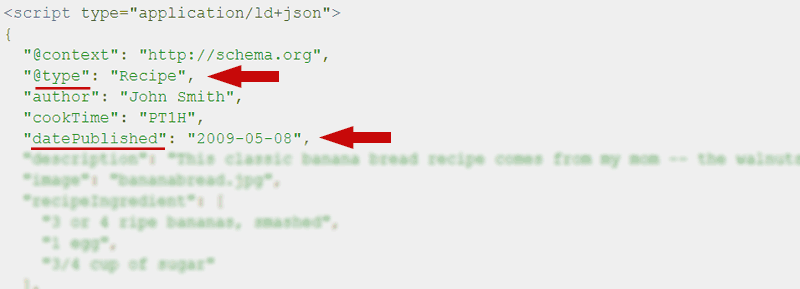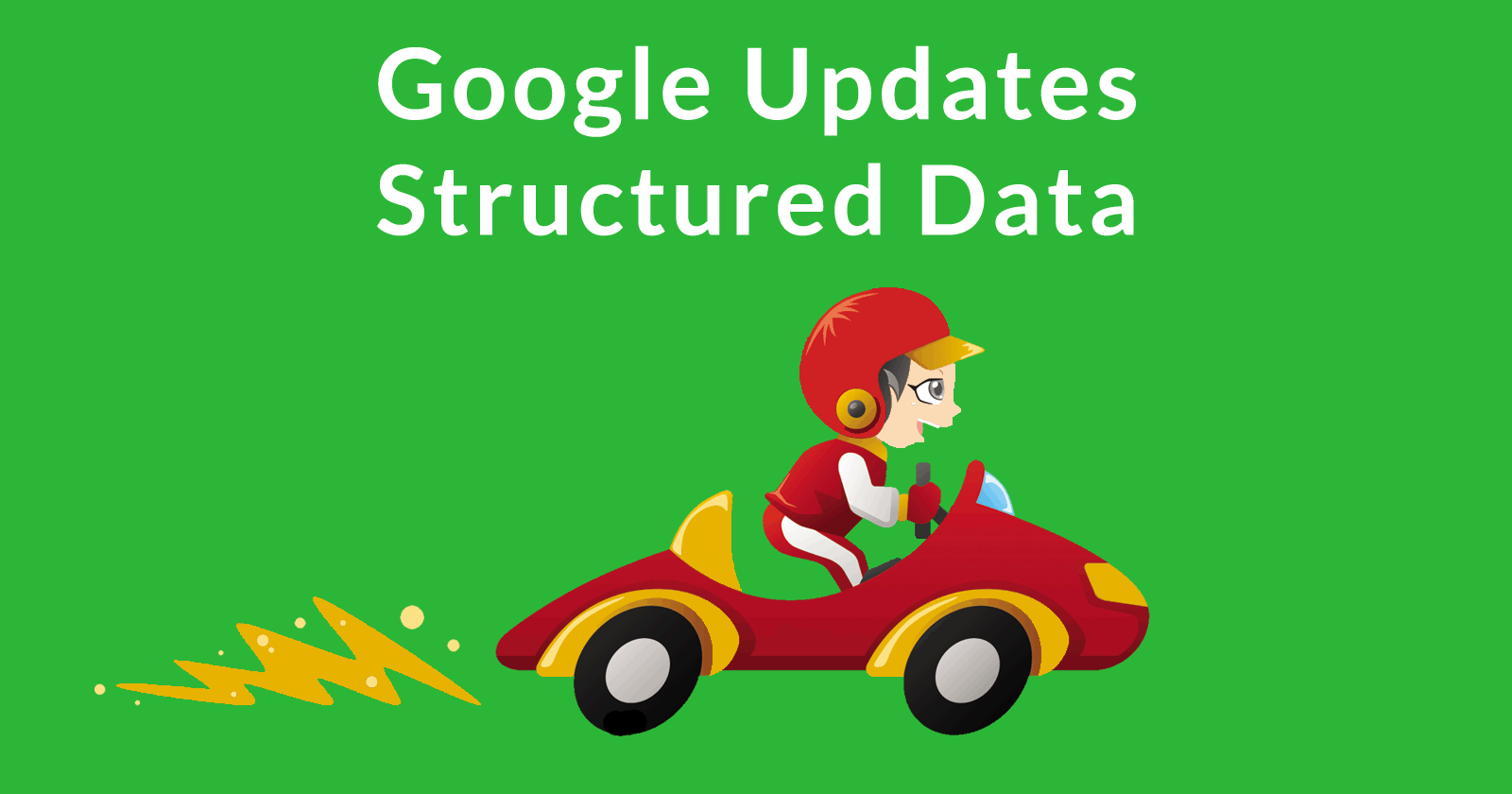Google has updated it’s Developers Page for article structured data, which includes recipe articles. The updates are related to publication and modification dates. The additional properties are optional and recommended only if you decide it’s applicable to your situation.
The Google Structured Data Testing Tool will not issue a warning if you do not use these properties in your structured data. There are practical reasons why you should consider using them.
What Changed on Google’s Developer Page?
Google’s Developer page on article related schemas was updated. Specifically, Google added an optional recommendation to use datePublished and dateModified properties to the article content type.
The use of these properties is entirely optional. Google leaves it to the publisher to decide if the properties are appropriate.
Should You Use these Properties?
These properties are useful for communicating when an article was published. This is especially important for topics that aren’t evergreen but tend to
change.
Examples of non-evergreen content are news, product reviews, and technology information.
In those situations it may be useful to signal to Google and the readers that an article is of a recent publication date. That in itself may make an article more appealing to a reader for content for which timeliness important.
Should Publishers of Evergreen Content Use It?
Evergreen content is content that stays the same year after year. Examples of evergreen content are movie reviews, recipes and how-to articles.
For an older article that is updated, then it may make sense to signal to Google and site visitors than an article has been modified to keep it relevant to the moment.
An example could be a technology related article where the technology is updated and so a tutorial would also need to be updated to keep it relevant.
The dateModified property is useful for signaling that the article was modified. This too could make an article more appealing to potential site visitors by indicating that the article is still relevant.
Should Recipe Bloggers Use these Properties?
Recipe content is generally considered evergreen content. But some may feel that recipes reflect how cooking is done at any given time and is subject to
change.
I asked Casey Markee, founder of Media Wyse. I asked Casey about this because structured data markup is important to recipe bloggers and Media Wyse has extensive experience auditing and helping recipe websites, including their structured data.
Casey noted that this kind of information is good for the user:
“Last modified/Updated notations are a user-first optimization practice, in my opinion. I believe that the more information I can provide for the user the better it is for them.”
Should recipe bloggers use these schema properties? Here is Casey’s answer:
“I recommend it in my website audits, so yes.”
Casey offered these insights:
“A lot of publishers don’t like to do it. They feel it undermines ‘evergreen content practices.’ Some bigger bloggers think that all recipes are ‘inherently’ evergreen. But I think that’s not the best approach. You can always improve recipes.
There is no real advantage from an SEO standpoint with Google. Google isn’t going to change crawling, I wouldn’t think.
But this may be another signal to enhance freshness on that content or stave off decay metrics?
Bottom Line: definitely little reason NOT to do this. All things considered.”
Schema.org datePublished Example:
The official documentation at Schema.org has published an example of how to use the datePublished property with JSON-LD. As it so happens, Schema.org uses the example of a recipe article. This gives more weight to Casey Markee’s recommendation of the use of this property for recipe content.
<script type=”application/ld+json”>
{
“@context”: “http://schema.org”,
“@type”: “Recipe”,
“author”: “John Smith”,
“cookTime”: “PT1H”,
“datePublished”: “2009-05-08”,
“description”: “This classic banana bread recipe comes from my mom — the walnuts add a nice texture and flavor to the banana bread.”,
“image”: “bananabread.jpg”,
“recipeIngredient”: [
“3 or 4 ripe bananas, smashed”,
“1 egg”,
“3/4 cup of sugar”
],
“interactionStatistic”: {
“@type”: “InteractionCounter”,
“interactionType”: “http://schema.org/Comment”,
“userInteractionCount”: “140”
},
“name”: “Mom’s World Famous Banana Bread”,
“nutrition”: {
“@type”: “NutritionInformation”,
“calories”: “240 calories”,
“fatContent”: “9 grams fat”
},
“prepTime”: “PT15M”,
“recipeInstructions”: “Preheat the oven to 350 degrees. Mix in the ingredients in a bowl. Add the flour last. Pour the mixture into a loaf pan and bake
for one hour.”,
“recipeYield”: “1 loaf”,
“suitableForDiet”: “http://schema.org/LowFatDiet”
}
</script>
As you can see, adding the additional publication date information is very simple. You just add the one line as shown above, within the appropriate section for the type of article. In this example, the type of article is Recipe. But it can be any kind of article.
“datePublished”: “2009-05-08”,
That’s it, very simple.
Just be sure to locate that publication date within the correct article type section, like in the example:
 Adding the datePublished property of the “Article” type is simple. You just add one line like in this example. This shows how to integrate it into the Recipe article type.
Adding the datePublished property of the “Article” type is simple. You just add one line like in this example. This shows how to integrate it into the Recipe article type.How to use dateModified
Using the above example, we can add the dateModified property like this:
<script type=”application/ld+json”>
{
“@context”: “http://schema.org”,
“@type”: “Recipe”,
“author”: “John Smith”,
“cookTime”: “PT1H”,
“datePublished”: “2009-05-08”,
“dateModified”: “2018-07-01”,
As you can see, adding the two properties is simple and not at all complicated, especially if you’re using JSON-LD. There are good reasons to use these properties. One way to decide whether to use these properties is to consider if the site visitor needs to know that a page was updated. At this point in time
Hat tip to Aaron Bradley for noticing the update to the developers page.
References
References from Schema.org
https://schema.org/Article
https://schema.org/datePublished
For Date Modified:
https://schema.org/DateTime
Google Structured Data Testing Tool
https://search.google.com/structured-data/testing-tool
Google’s Developer Page for Article Schema
https://developers.google.com/search/docs/data-types/article#non-amp
More Resources
- SEO for Rich Results: How to Find & Fix Structured Data Errors
- What is Schema Markup & Why It’s Important for SEO
- Getting Started With Schema Markup for SEO
Images by Shutterstock, Modified by Author
Screenshots by Author





